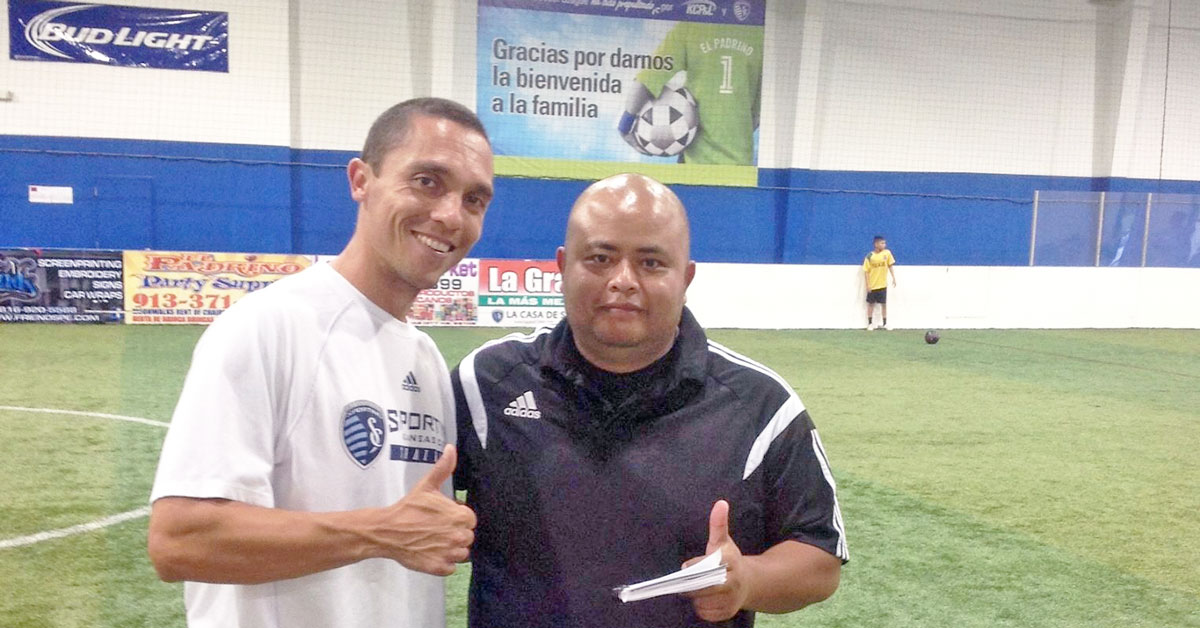Raul Villegas had been living in America as an undocumented immigrant for more than 20 years when he decided to build an indoor soccer facility in Kansas City, Kansas. That was in 2013, long before the Deferred Action for Childhood Arrivals program, or DACA, removed the threat of deportation for many undocumented immigrants. To meet his goal, Villegas knew he would have to raise $400,000, not an easy task given that he could have been deported at any time.

Raul Villegas, right
“A lot of people told me not to do it because of my immigration status,” Villegas says. “They thought I was a bit crazy. There wasn’t a certainty that I would pay it back.”
Villegas didn’t listen. “I thought that the kids in this community needed something like this,” he says. “You have to take chances in order to achieve something that you really want.”
I thought that the kids in this community needed something like this. You have to take chances in order to achieve something that you really want.
After two years spent knocking on doors of construction companies, restaurants, and other potential lenders and investors in the Hispanic community, Villegas built a 40,000-square-foot facility. Soccer Nation, as he aptly named it, regularly hosts youth and adult soccer leagues and academies, as well as tournaments drawing players from across the Midwest. The facility, which includes one small and two large soccer fields, is adorned with flags from around the world. The players that come through its doors are a virtual microcosm of the city’s growing immigrant community – including newcomers from 25 nations throughout the Americas, Africa, Asia, and Europe.
Soccer Nation has quickly become a major success. The business has five full-time employees, along with 20 referees. It grosses $500,000 in revenues each year. Villegas funnels the profits into programming for children, paying league dues for inner-city soccer players whose parents struggle to cover the cost of membership.
“We want to give kids a better chance,” Villegas says. “One of our biggest goals is to give our kids tools to play soccer so maybe in the future they can get a scholarship, and get good grades. For a lot of them it will be the first generation to go to college.”
Villegas knows well the powerful influence a team sport can have on a young person. When he was 11 years old, his parents moved the family from a “very poor” town in Mexico to California in search of a better life for their children. They came to the United States in 1990, and lived in South Central Los Angeles.
“I was scared,” says Villegas. “But the first time I went to a park and I saw a soccer ball rolling through and I started playing, I thought maybe it was going to be OK being here. That’s something that I see on the kids’ faces here. They find an escape in soccer and are mixing with the American community, because those kids also play soccer.”
As a young adult, Villegas moved to Kansas City to help his father manage a grocery store. He now owns his own soccer league and apparel store called “El Padrino,” or “Godfather” in Spanish. He wanted to apply for legal immigration status in 2005, but was told he’d have to leave the United States for anywhere from two to 10 years to be eligible – an absence that was out of the question. “My son was about two years old then and my daughter had just been born,” he explains. “I didn’t want to be apart from them.” His wife, who is also from Mexico, has been a U.S. citizen for 20 years, so Villegas stayed and kept applying for residency. It was granted in 2015. In 2020, he’ll be eligible for citizenship.
Villegas says Soccer Nation is his way to give back, to help both immigrants and native Kansas City residents give their children the kind of boost his parents gave him. “A lot of the parents work about 60 to 70 hours a week. They leave their kids at home,” he says. “Most of my coaches, they have to pick every single one of those kids up.”
“I think those kids have a greater chance by playing soccer.”

